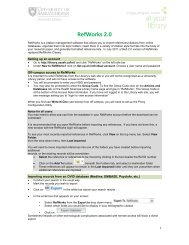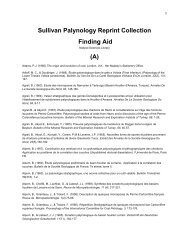St. Thomas More College, University of Saskatchewan Department ...
St. Thomas More College, University of Saskatchewan Department ...
St. Thomas More College, University of Saskatchewan Department ...
Create successful ePaper yourself
Turn your PDF publications into a flip-book with our unique Google optimized e-Paper software.
Appendix A<br />
Instructions for Researchers using the Psychology 110 Participant Pool<br />
**Please read this form in its entirety before beginning your journey through SONA systems. Most questions will be<br />
answered and there is contact information on the bottom if any part <strong>of</strong> this is unclear.<br />
General Overview<br />
1. Use <strong>of</strong> the Participant Pool is normally available to regular faculty members <strong>of</strong> the <strong>Department</strong> <strong>of</strong> Psychology,<br />
adjunct and affiliated faculty and those who work directly under their supervision. Consideration may be given<br />
to those from outside the department, subject to availability.<br />
2. Approval to use the Participant Pool may be granted to anyone meeting the above criteria, provided that their<br />
research has passed the ethical review process <strong>of</strong> the <strong>University</strong> <strong>of</strong> <strong>Saskatchewan</strong>. If total demand exceeds<br />
resources, some restrictions may be imposed.<br />
3. Approval is granted by submitting electronic consent and debriefing forms along with evidence indicating the<br />
research has already passed ethics review to the Participant Pool Administrator.<br />
Overview <strong>of</strong> Benefits<br />
The participant pool is designed and organized as a mutually beneficial arrangement between students in the<br />
introductory course and researchers in the <strong>Department</strong> <strong>of</strong> Psychology. The benefits to the researchers are clear and<br />
simple: they gain easy access to a sizeable set <strong>of</strong> willing participants for research.<br />
The benefits for the students are also significant, but researchers must take care to ensure that they are realized.<br />
First, students may earn extra points on their course grade (up to a total <strong>of</strong> 5). It is up to researchers to ensure that<br />
credit is properly given. Secondly, the pool provides opportunities for students to experience first-hand a variety <strong>of</strong><br />
research areas and techniques. This is educationally the more important objective, but the extent to which it occurs<br />
depends a great deal on the behaviour <strong>of</strong> researchers. It is very important for the researcher to tell participants as<br />
much as is reasonable about the research, before they participate to ensure informed consent. Further, once the<br />
experiment is completed, it is essential that students are debriefed carefully and have their questions answered.<br />
Restrictions<br />
Given that the participant pool is used primarily as a means for students to increase course grades, it is only fair that<br />
everyone have equal access to the same number <strong>of</strong> studies. For this reason, we generally do not allow researchers to<br />
disqualify or restrict people based on demographic characteristics (i.e., “only women may participate in this study”).<br />
Instead, what we would prefer is that you write a clause in the description part <strong>of</strong> your study to the effect <strong>of</strong>: “For<br />
this study we are primarily interested in testing female participants. Males can participate for credit but their data<br />
will be discarded before analysis.” This way, everyone technically has equal access. In this particular scenario, you<br />
may still have males participating in your study and while this may seem inconvenient, it is necessary to ensure<br />
everyone has equal access. For example, there was a disproportionate amount <strong>of</strong> studies in 2010/2011 which were<br />
directed at female participants. Any questions beyond this can be directed to the participant pool administrator.<br />
Procedures for Using the Pool:<br />
1. First, contact the participant pool administrator to receive an account. The administrator will need to know your<br />
first and last name, your NSID, a contact number, your supervisor’s name, how many participants you are<br />
requesting and your class standing (i.e. whether you are an honours student, 3 rd year lab student, graduate<br />
student, RA, etc).<br />
15
















